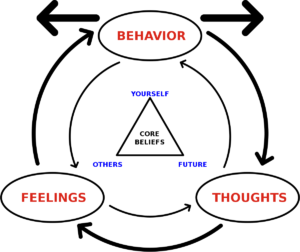Depression is a serious mental illness that can cause a lot of pain and suffering for those who are affected by it. Unfortunately, many people do not know how to get help for their depression. Cognitive behavioral therapy (CBT) is one of the most effective treatments for depression. In this guide, we will discuss what CBT is, how it works, and how you can use it to overcome your depression.
Contents
- 1 What Is Cognitive Behavioral Therapy?
- 2 How Does Cognitive Behavioural Therapy For Depression Work?
- 3 What Techniques Are Used In CBT For Depression?
- 4 What Are The Benefits Of Cognitive Behavioral Therapy For Depression?
- 5 How Can I Practice CBT For Depression At Home?
- 6 How Long Does CBT Take To Work For Depression?
- 7 Conclusion
What Is Cognitive Behavioral Therapy?
 Cognitive Behavioral Therapy (CBT) is a type of psychotherapy used to help individuals identify and change unhelpful or unhealthy thinking patterns and behaviors. It combines elements of both cognitive therapy, which focuses on changing the way people think, and behavioral therapy, which focuses on changing behavior.
Cognitive Behavioral Therapy (CBT) is a type of psychotherapy used to help individuals identify and change unhelpful or unhealthy thinking patterns and behaviors. It combines elements of both cognitive therapy, which focuses on changing the way people think, and behavioral therapy, which focuses on changing behavior.
CBT has been found to be effective in treating a variety of mental health conditions, such as depression, anxiety, phobias, and post-traumatic stress disorder. It can also be used to help people manage everyday problems and improve their overall quality of life.
Therefore, if you want to make positive changes in your life and improve how you think, behave, and feel, Cognitive Behavioral Therapy can be a helpful tool. It is based on the idea that our thoughts—not external events or situations—are responsible for our feelings and behaviors.
How Does Cognitive Behavioural Therapy For Depression Work?
Depression is a common mental health disorder that can have a major adverse impact on an individual’s life. It is characterized by persistent low mood and feelings of sadness, worthlessness, and hopelessness. And there is no one-size-fits-all approach to treating depression.
Cognitive Behavioral Therapy for depression is a type of psychotherapy that has been proven to be effective in treating the symptoms of depression. It works by helping the patient to identify and challenge the negative thinking patterns that contribute to their depression. The therapist works with the patient to develop healthier thought patterns and behaviors. As well as teaching them coping skills to help reduce symptoms of depression.
Overall, the process is easy and very effective. A patient will start by meeting with their therapist to discuss their symptoms and identify the negative thoughts that are contributing to those symptoms. From there, they will work on identifying irrational beliefs and replacing them with healthier thought patterns.
What Techniques Are Used In CBT For Depression?
 The following are the most common techniques used in Cognitive Behavioral Therapy (CBT) for depression:
The following are the most common techniques used in Cognitive Behavioral Therapy (CBT) for depression:
- Behavioral Activation
This technique encourages a person to become more active, both physically and mentally. By engaging in activities that raise endorphins and increase motivation, individuals can often reduce feelings of despair and hopelessness associated with depression.
- Cognitive Restructuring
This technique focuses on identifying and reframing negative automatic thoughts, the distorted beliefs that lead to destructive behaviors in depression. By changing these irrational thought patterns, individuals can develop healthier coping skills and manage difficult emotions more effectively.
This type of therapy is designed to help individuals improve their communication and social skills, which can be impaired by depression. The therapist helps the individual learn how to express feelings in a constructive way, improve relationships with others, and ultimately lead a healthier life.
- Problem-Solving Therapy
This technique focuses on helping individuals find solutions to specific problems that are interfering with their quality of life and contributing to depression. By learning practical problem-solving strategies, individuals can better manage difficult situations and reduce their depression symptoms.
These techniques are designed to help individuals reduce stress and anxiety associated with depression. Common relaxation techniques used in CBT include deep breathing, progressive muscle relaxation, guided imagery, and yoga.
These techniques can be combined in a variety of ways depending on the individual’s needs. With the guidance of a qualified mental health professional, individuals can use these techniques to feel more in control of their emotions and build more fulfilling lives.
What Are The Benefits Of Cognitive Behavioral Therapy For Depression?
If you are struggling with depression, cognitive-behavioral therapy (CBT) can help. This type of talk therapy has been proven to be effective in treating many different types of mental health issues, including depression. Here are a few common benefits that you may experience during the course of CBT for depression:
1. Improved Self-Esteem and Self-Confidence: CBT helps to challenge negative thinking patterns and replace them with more positive thoughts and beliefs about oneself. This can help improve your self-image and increase your confidence in yourself.
2. Better coping skills: CBT teaches different strategies for managing difficult thoughts and emotions associated with depression. This can include problem-solving techniques and relaxation methods that help reduce stress levels.
3. Increased understanding: Another benefit that people experience from CBT is an increased understanding of their own behavior and emotions. This can help them recognize patterns or triggers that lead to depression and take steps to prevent further episodes.
4. Improved relationships: Finally, CBT can also help improve your relationships with others by teaching you how to effectively communicate your feelings and needs in a healthy way.
The benefits of cognitive-behavioral therapy for depression can be seen in the short term. But studies have also shown that it is a very effective long-term treatment option as well. If you are struggling with depression and would like to learn more about CBT, talk to your doctor or therapist today.
How Can I Practice CBT For Depression At Home?
 Sometimes, practicing CBT for depression at home can be a great way to find relief. Here are some tips to help you get started:
Sometimes, practicing CBT for depression at home can be a great way to find relief. Here are some tips to help you get started:
- Set goals: Start by setting small goals that you can realistically achieve. It’s important to make sure the goals are achievable, so don’t aim too high right away.
- Track your progress: Keep track of your progress and review it regularly. This will help you identify areas that need more focus or improvement, so you can adjust your goals as needed.
- Practice relaxation techniques: Try different methods such as deep breathing exercises, guided imagery, progressive muscle relaxation, or mindfulness meditation to reduce stress levels.
- Monitor your thinking: Pay attention to the thoughts and beliefs you have about yourself, others, and the world. It can be helpful to write them down so you can identify any patterns or irrational beliefs.
- Practice self-compassion: Make sure to practice self-compassion and kindness. Instead of focusing on negative thoughts and feelings, focus on positives.
- Seek support: Don’t be afraid to seek help from a mental health professional or support group if needed. It can be really helpful to talk with someone who understands what you’re going through.
These tips can help you practice CBT for depression at home. Remember, though, that it’s important to consult a mental health professional if you have any serious concerns. With the right support and guidance, CBT can be an effective tool for managing depression.
How Long Does CBT Take To Work For Depression?
Many people may feel better after just a few sessions. But typically it takes around 5-6 months to see the full benefits of CBT for depression. The number and frequency of the therapy sessions will depend on your individual needs and the severity of your symptoms.
It is important to stick with your treatment plan and attend all of your scheduled appointments in order to maximize the benefits of CBT. You may need to practice the skills and techniques learned in therapy on your own, in between sessions, or as part of a home program. This can help you maintain improvements over time and stay well even after therapy has ended.
CBT is a long-term solution that requires commitment and effort from both the patient and the therapist. The therapy focuses on developing a better understanding of your thoughts, feelings, and behaviors. That is to improve how you handle challenging situations.
With regular practice, CBT can help people with depression learn how to cope with their symptoms more effectively. And reduce their risk for relapse.
Conclusion
To conclude, cognitive behavioral therapy for depression has been proven to be an effective approach to improving mental health. And reducing depressive symptoms in individuals. It is a practical, evidence-based form of therapy that can help people change their thinking patterns and behaviors to better cope with difficult situations. CBT also encourages individuals to take responsibility for their own well-being and take action toward improved mental health.
For more information, please contact MantraCare. Depression is a mental illness characterized by persistent feelings of sadness, hopelessness, and loss of interest in daily activities. If you have any queries regarding Online Depression Counseling experienced therapists at MantraCare can help: Book a trial Depression Therapy session


